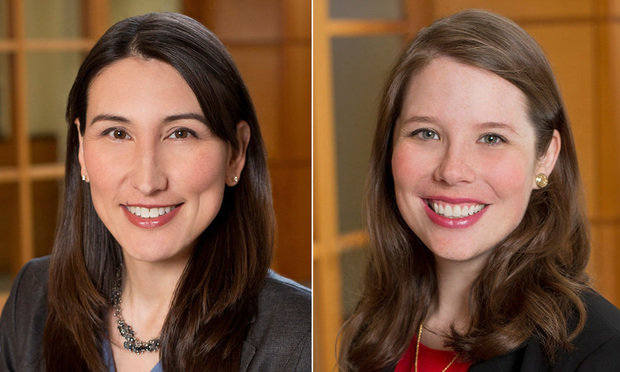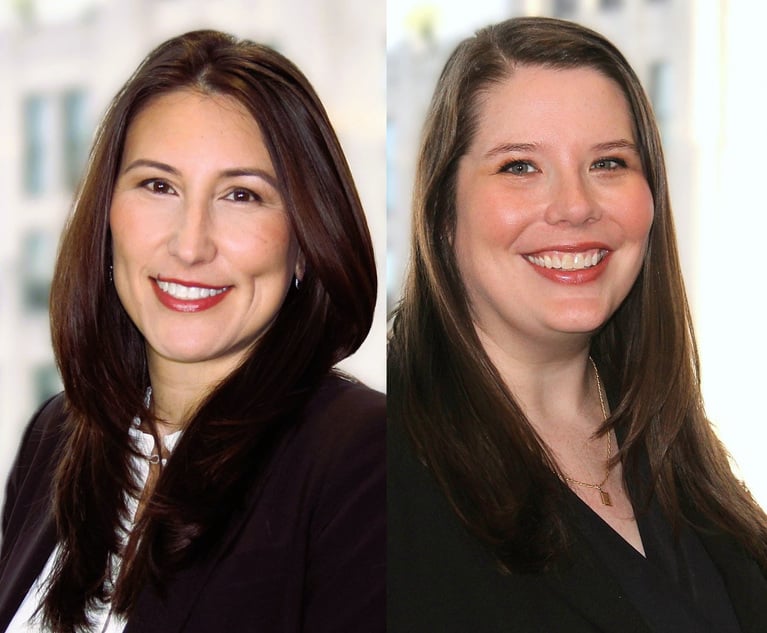Five Tips for Law Firm Associates in Complying With Their Professional Duties
Associates may sometimes feel that they serve two masters: their law firms and their personal obligations under the Rules of Professional Conduct.
January 29, 2018 at 11:31 AM
6 minute read

Associates in law firms have a unique role. Sometimes, they bear the laboring oar of completing legal services under the direction and supervision of partners and other senior attorneys. Associates are often at a point in which they don't yet have clients of their own, but they are honing the skills that will carry them through their careers.
Notwithstanding a seemingly junior role, associates still have an individual obligation to comply with professional and ethical obligations. This dynamic can be complex for associates, who may sometimes feel that they serve two masters: their law firms and their personal obligations under the Rules of Professional Conduct.
This article discusses five areas of particular importance to associates in navigating the professional duties and obligations that may arise during the nascent years of their careers.
Duty to Report Issues
Associates may sometimes believe they are expected to do as they are told, without question, and that only law firm partners are responsible for ensuring that a matter is handled ethically. This is a common misperception. Associates cannot turn a blind eye to ethical wrongdoing and must adhere to their duties under the Georgia Rules of Professional Conduct. Associates generally are not excused from violations of their professional duties by stating that they were simply following orders or relying on partners.
Associates who observe misconduct on their matters can take steps to alert others, most often the firm's internal risk manager or general counsel. This is consistent with the bar's encouragement of all attorneys to “inform the appropriate professional authority” when they have knowledge of another lawyer committing a violation of the professional rules related to honesty, trustworthiness, or fitness. (Ga. R. Prof'l. Conduct 8.3)
At the first sign of a problem, associates can share issues with internal risk managers to alert the firm to potential ethics or professional issues. In so doing, associates can protect their clients, their firms and their own reputations. Staying silent about an issue because of a concern about “tattling” internally, particularly when that issue could negatively impact the client or the firm, is typically not advisable. Firms can also take steps to ensure that junior attorneys are aware of the firm's expectations and that such disclosures are encouraged.
Duty to Supervise Nonlawyers
Associates are often supervised by more senior attorneys. Still, even early on, associates may also elect to delegate work to secretaries, legal assistants, paralegals and other administrative professionals. When delegating work to nonlawyers, associates have corresponding duties of oversight and supervision. In Georgia, the State Disciplinary Board issued persuasive authority calling for “strict adherence to a program of supervision and direction” when assigning tasks in a legal matter to paraprofessionals. (Georgia Advisory Opinion 21 (1997))
Additionally, associates can be wary of delegating assignments to nonlawyers that could constitute the unauthorized practice of law. Many associates supervising nonlawyers will also take care to ensure that they are not instructing nonlawyers to do any task that the associates themselves are ethically prohibited from doing. For example, if an associate is not permitted to directly contact a witness, that associate cannot instruct their assistant to do so instead. Indeed, that is true for attorneys of any level. (Ga. R. Prof'l Conduct 5.3)
Risks of Social Media Posting
Social media has become increasingly useful for attorneys communicating with other lawyers and with actual and prospective clients. These platforms typically also allow associates to build relationships and networks in the legal community and to reach potential clients.
These benefits come with certain costs, however. Associates should be mindful of their professional duties when posting to a social media site. For example, a personal social media profile may qualify as a legal advertisement, subject to the restrictions of the Rules of Professional Conduct. Likewise, an associate could inadvertently create an attorney-client relationship or breach the duty of confidentiality by providing advice and posting information online.
Associates also can find themselves in trouble with their law firms if they unwittingly create a business conflict. Posting a personal opinion about an industry or company could result in headaches for the associate's firm that represents that industry or company.
Risks of Moonlighting
Associates sometimes take a second job to explore other interests or to assist with law school debts or other expenses. While some might choose a second job in an unrelated field to earn a little extra cash, associates moonlighting with outside legal work face unique risks. Although some risks can be addressed through obtaining the full knowledge and consent of the law firms involved and of any affected clients, this step (which can also be quite administratively daunting) might not alleviate all potential risks.
For example, associates transporting and working on files from their off-hours legal jobs may increase the risks of breaches in confidentiality or potential conflicts of interest when working for clients during their day jobs. Further, moonlighting creates insurance coverage risks. A moonlighting associate may trigger their primary employer firm's policy, even if a representation is not directly affiliated with the firm. Even worse, an associate could be left personally liable for alleged malpractice.
Moonlighting associates also risk the second job draining their productivity and ability to meet deadlines in their day job, increasing the likelihood of mistakes or errors.
The duties and risks discussed above provide an overview of some issues that associates may face in adhering to their professional and ethical duties. Though associates are themselves accustomed to being supervised by partners and other senior attorneys, associates should be careful not to overlook their own duties as attorneys.
Shari L. Klevens is a partner at Dentons US in Atlanta and Washington and serves on the firm's U.S. board of directors. She represents and advises lawyers and insurers on complex claims and is co-chair of Dentons' global insurance sector team.
Alanna Clair is a senior managing associate at Dentons US in Washington and focuses on professional liability defense. Klevens and Clair are co-authors of “The Lawyer's Handbook: Ethics Compliance and Claim Avoidance.”
This article was prepared with assistance from Keshia Lipscomb, an associate in the Atlanta office of Dentons US LLP.
This content has been archived. It is available through our partners, LexisNexis® and Bloomberg Law.
To view this content, please continue to their sites.
Not a Lexis Subscriber?
Subscribe Now
Not a Bloomberg Law Subscriber?
Subscribe Now
NOT FOR REPRINT
© 2025 ALM Global, LLC, All Rights Reserved. Request academic re-use from www.copyright.com. All other uses, submit a request to [email protected]. For more information visit Asset & Logo Licensing.
You Might Like
View All

CFPB Proposes Rule to Regulate Data Brokers Selling Sensitive Information
5 minute read
Trending Stories
- 1Two Wilkinson Stekloff Associates Among Victims of DC Plane Crash
- 2Two More Victims Alleged in New Sean Combs Sex Trafficking Indictment
- 3Jackson Lewis Leaders Discuss Firm's Innovation Efforts, From Prompt-a-Thons to Gen AI Pilots
- 4Trump's DOJ Files Lawsuit Seeking to Block $14B Tech Merger
- 5'No Retributive Actions,' Kash Patel Pledges if Confirmed to FBI
Who Got The Work
J. Brugh Lower of Gibbons has entered an appearance for industrial equipment supplier Devco Corporation in a pending trademark infringement lawsuit. The suit, accusing the defendant of selling knock-off Graco products, was filed Dec. 18 in New Jersey District Court by Rivkin Radler on behalf of Graco Inc. and Graco Minnesota. The case, assigned to U.S. District Judge Zahid N. Quraishi, is 3:24-cv-11294, Graco Inc. et al v. Devco Corporation.
Who Got The Work
Rebecca Maller-Stein and Kent A. Yalowitz of Arnold & Porter Kaye Scholer have entered their appearances for Hanaco Venture Capital and its executives, Lior Prosor and David Frankel, in a pending securities lawsuit. The action, filed on Dec. 24 in New York Southern District Court by Zell, Aron & Co. on behalf of Goldeneye Advisors, accuses the defendants of negligently and fraudulently managing the plaintiff's $1 million investment. The case, assigned to U.S. District Judge Vernon S. Broderick, is 1:24-cv-09918, Goldeneye Advisors, LLC v. Hanaco Venture Capital, Ltd. et al.
Who Got The Work
Attorneys from A&O Shearman has stepped in as defense counsel for Toronto-Dominion Bank and other defendants in a pending securities class action. The suit, filed Dec. 11 in New York Southern District Court by Bleichmar Fonti & Auld, accuses the defendants of concealing the bank's 'pervasive' deficiencies in regards to its compliance with the Bank Secrecy Act and the quality of its anti-money laundering controls. The case, assigned to U.S. District Judge Arun Subramanian, is 1:24-cv-09445, Gonzalez v. The Toronto-Dominion Bank et al.
Who Got The Work
Crown Castle International, a Pennsylvania company providing shared communications infrastructure, has turned to Luke D. Wolf of Gordon Rees Scully Mansukhani to fend off a pending breach-of-contract lawsuit. The court action, filed Nov. 25 in Michigan Eastern District Court by Hooper Hathaway PC on behalf of The Town Residences LLC, accuses Crown Castle of failing to transfer approximately $30,000 in utility payments from T-Mobile in breach of a roof-top lease and assignment agreement. The case, assigned to U.S. District Judge Susan K. Declercq, is 2:24-cv-13131, The Town Residences LLC v. T-Mobile US, Inc. et al.
Who Got The Work
Wilfred P. Coronato and Daniel M. Schwartz of McCarter & English have stepped in as defense counsel to Electrolux Home Products Inc. in a pending product liability lawsuit. The court action, filed Nov. 26 in New York Eastern District Court by Poulos Lopiccolo PC and Nagel Rice LLP on behalf of David Stern, alleges that the defendant's refrigerators’ drawers and shelving repeatedly break and fall apart within months after purchase. The case, assigned to U.S. District Judge Joan M. Azrack, is 2:24-cv-08204, Stern v. Electrolux Home Products, Inc.
Featured Firms
Law Offices of Gary Martin Hays & Associates, P.C.
(470) 294-1674
Law Offices of Mark E. Salomone
(857) 444-6468
Smith & Hassler
(713) 739-1250







